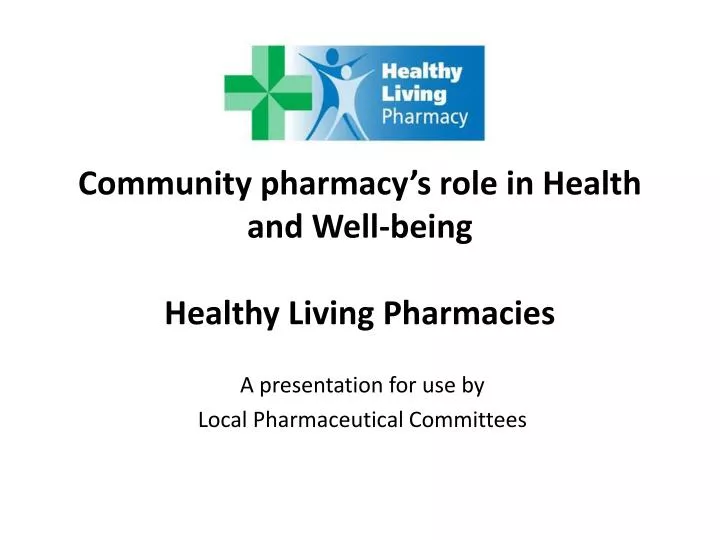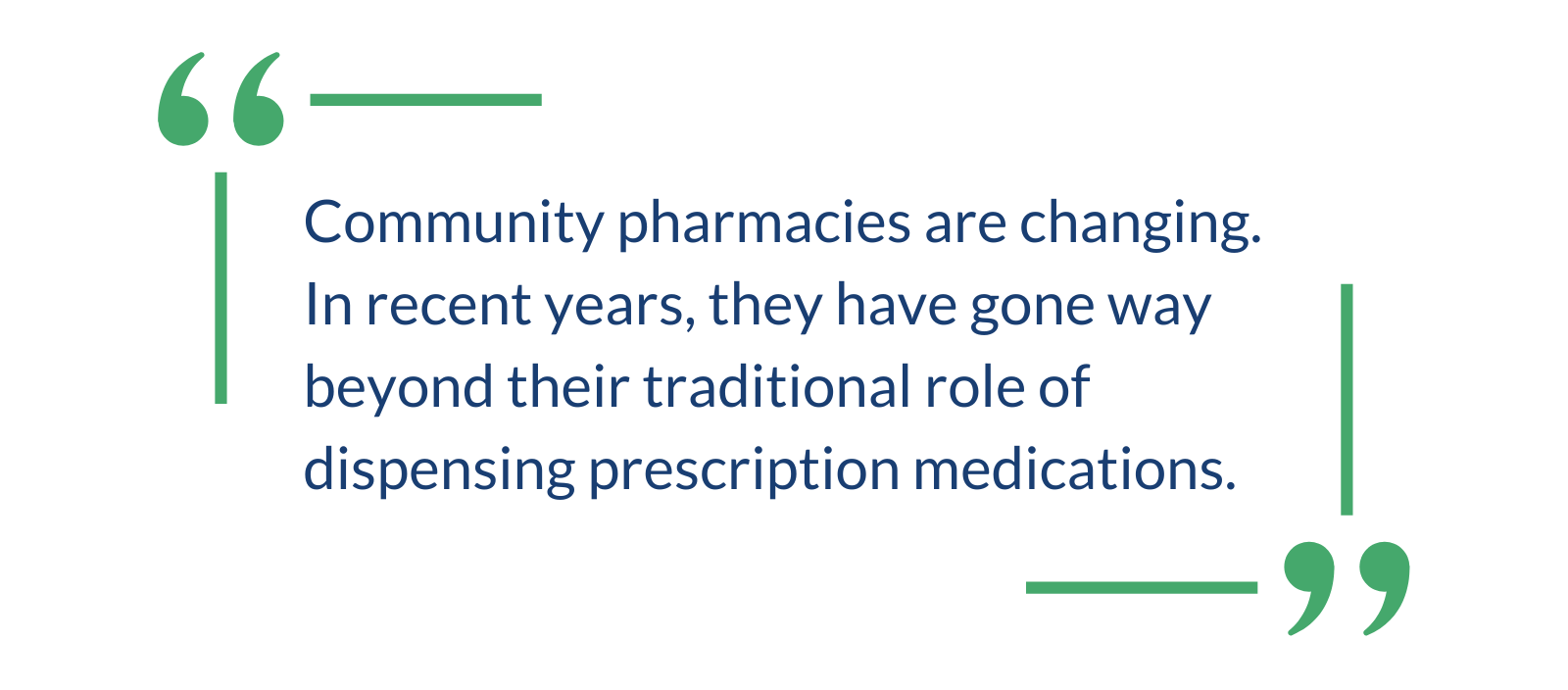The Vital Role of Community Pharmacies in Modern Healthcare: A Comprehensive Look
Related Articles: The Vital Role of Community Pharmacies in Modern Healthcare: A Comprehensive Look
Introduction
In this auspicious occasion, we are delighted to delve into the intriguing topic related to The Vital Role of Community Pharmacies in Modern Healthcare: A Comprehensive Look. Let’s weave interesting information and offer fresh perspectives to the readers.
Table of Content
The Vital Role of Community Pharmacies in Modern Healthcare: A Comprehensive Look

In an era marked by rapid advancements in medicine and healthcare delivery, the role of the community pharmacy, often referred to as a "map pharmacy," has evolved significantly. These cornerstones of local communities serve as more than just dispensers of medications; they play a crucial role in promoting health, improving medication adherence, and facilitating patient access to essential healthcare services.
The Evolution of Community Pharmacies: From Dispensary to Health Hub
Historically, pharmacies were primarily focused on dispensing medications prescribed by physicians. However, the landscape has transformed, with community pharmacies assuming a broader role in healthcare. This evolution is driven by several factors:
- Increased Focus on Patient Care: Pharmacists are increasingly recognized as integral members of the healthcare team. Their expertise in medication knowledge, drug interactions, and patient counseling is invaluable in ensuring safe and effective medication use.
- Shifting Healthcare Landscape: The rise of chronic diseases and an aging population has led to a greater emphasis on preventative care and disease management. Community pharmacies are well-positioned to play a key role in these areas.
- Technological Advancements: The advent of electronic health records, telemedicine, and mobile health applications has enabled pharmacies to connect with patients more effectively and provide a wider range of services.
Key Roles of Community Pharmacies in Healthcare
Today, community pharmacies offer a wide array of services that contribute significantly to the health and well-being of their communities:
1. Medication Dispensing and Management:
- Accurate Dispensing: Pharmacists ensure the accurate dispensing of medications, adhering to prescriptions and verifying patient information to minimize errors.
- Medication Counseling: They provide comprehensive counseling on the proper use, dosage, side effects, and potential interactions of medications.
- Medication Adherence Programs: They implement programs to improve medication adherence, which is crucial for effective treatment and positive health outcomes.
- Medication Reviews: Pharmacists conduct medication reviews to identify potential drug interactions, allergies, and dosage adjustments, leading to safer and more effective medication use.
2. Health Promotion and Disease Prevention:
- Immunizations: Many pharmacies offer a range of immunizations, including flu shots, pneumonia vaccines, and shingles vaccines, promoting public health and reducing disease transmission.
- Health Screenings: Pharmacies conduct health screenings for conditions like blood pressure, cholesterol, and glucose levels, enabling early detection and intervention.
- Health Education: They provide educational materials and resources on various health topics, empowering patients to make informed decisions about their health.
- Over-the-Counter (OTC) Medication Counseling: Pharmacists offer guidance on choosing the right OTC medications for common ailments, ensuring safe and effective self-treatment.
3. Patient Access to Healthcare Services:
- Point-of-Care Testing: Pharmacies offer point-of-care testing for conditions like strep throat, urinary tract infections, and influenza, providing rapid diagnosis and treatment.
- Prescription Refills: They facilitate convenient prescription refills, ensuring patients have access to their medications without unnecessary delays.
- Medication Delivery: Some pharmacies offer medication delivery services, particularly beneficial for individuals with mobility limitations or busy schedules.
- Collaboration with Healthcare Providers: They collaborate with physicians, nurses, and other healthcare professionals to ensure seamless patient care and optimal medication management.
Benefits of Community Pharmacies:
The impact of community pharmacies on healthcare extends beyond their direct services. They offer numerous benefits to patients, communities, and the healthcare system as a whole:
- Accessibility and Convenience: Community pharmacies are conveniently located in local neighborhoods, providing easy access to healthcare services for a wide range of individuals.
- Cost-Effectiveness: By providing accessible and comprehensive services, pharmacies help to reduce healthcare costs by preventing unnecessary hospitalizations and emergency room visits.
- Improved Patient Outcomes: Through medication management, health education, and preventive care services, pharmacies contribute to improved patient outcomes and overall health.
- Community Engagement: Community pharmacies are often deeply embedded in their communities, fostering relationships with local residents and providing a sense of trust and familiarity.
- Support for Local Businesses: They contribute to the economic vitality of local communities by providing employment opportunities and supporting local businesses.
FAQs Regarding Community Pharmacies:
1. What services are typically offered by community pharmacies?
Community pharmacies offer a wide range of services, including medication dispensing, counseling, health screenings, immunizations, point-of-care testing, prescription refills, medication delivery, and health education.
2. How can I find a community pharmacy near me?
You can find a community pharmacy near you using online search engines, pharmacy locator tools, or by asking for recommendations from your healthcare provider.
3. What are the advantages of using a community pharmacy?
Community pharmacies offer several advantages, including accessibility, convenience, personalized care, medication management expertise, and cost-effectiveness.
4. Can community pharmacies provide healthcare advice?
Pharmacists are trained healthcare professionals who can provide medication counseling and health advice, but they cannot diagnose or treat medical conditions. If you have concerns about your health, it is essential to consult with a physician or other healthcare professional.
5. What are the best ways to utilize the services of a community pharmacy?
To maximize the benefits of a community pharmacy, you should:
- Ask questions: Don’t hesitate to ask your pharmacist questions about your medications, health conditions, and any concerns you may have.
- Schedule regular medication reviews: Request a medication review with your pharmacist to ensure your medications are still appropriate and effective.
- Utilize health screenings and immunizations: Take advantage of the health screenings and immunizations offered by your pharmacy.
- Participate in health education programs: Attend health education sessions or workshops offered by your pharmacy to learn more about health topics that interest you.
Tips for Utilizing Community Pharmacies Effectively:
- Maintain a current list of medications: Keep a list of all medications you are taking, including over-the-counter medications, supplements, and herbal remedies.
- Bring your insurance card and any relevant medical information: Ensure you have your insurance card and any medical records or information that may be helpful for the pharmacist.
- Communicate any changes in your health: Inform your pharmacist about any changes in your health, including new diagnoses, medications, or allergies.
- Ask for assistance with medication adherence: If you struggle with taking your medications as prescribed, ask your pharmacist for help with medication adherence strategies.
Conclusion:
Community pharmacies have become vital components of the modern healthcare system, playing a crucial role in promoting health, improving medication adherence, and facilitating patient access to essential healthcare services. Their accessibility, convenience, and comprehensive services make them invaluable resources for individuals and communities alike. By understanding the role of community pharmacies and utilizing their services effectively, patients can contribute to their own health and well-being, ensuring that these essential healthcare providers continue to play a vital role in the future of healthcare delivery.








Closure
Thus, we hope this article has provided valuable insights into The Vital Role of Community Pharmacies in Modern Healthcare: A Comprehensive Look. We thank you for taking the time to read this article. See you in our next article!